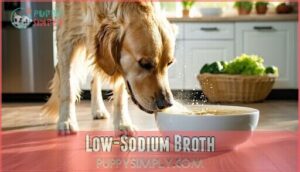This site is supported by our readers. We may earn a commission, at no cost to you, if you purchase through links.

Plain, low-sodium broths made from chicken, beef, or turkey work best for your furry friend. Skip store-bought versions loaded with onion powder, garlic, or excessive salt – these spell trouble for pups.
Homemade broth offers the safest route, providing hydration and nutrition without harmful additives.
Your dog will benefit from improved joint health, better digestion, and a shinier coat when you serve the right broth in moderation.
The key lies in knowing which ingredients to avoid and how to prepare broth that’s both delicious and dog-safe.
Table Of Contents
- Key Takeaways
- Benefits of Dog Broth
- Can Dogs Eat Broth
- Types of Dog Broth
- Broth Preparation Tips
- Broth Safety Considerations
- Frequently Asked Questions (FAQs)
- Can dogs eat chicken broth?
- Can dogs eat beef broth?
- Can dogs eat bone broth?
- How to make chicken bone broth for dogs?
- Can a dog eat store-bought broth?
- How long should a small dog eat broth?
- Is it okay to put beef broth on dog food?
- Can dogs drink human broth?
- How much broth can dogs safely consume daily?
- Can puppies under six months drink broth?
- Conclusion
Key Takeaways
- You can safely give your dog broth, but stick to homemade versions – Make plain chicken, beef, or turkey broth without any seasonings, onions, or garlic that could harm your pup.
- Skip store-bought broths since they’re loaded with dangerous ingredients – Most contain onion powder, garlic, and excessive sodium that can cause serious health problems for dogs.
- Serve broth in moderation as a supplement, not a meal replacement – Offer 1-4 tablespoons per 20 pounds of body weight daily to boost hydration and make meals more appealing.
- Watch for toxic ingredients and consult your vet if you’re unsure – Always check labels for harmful additives and get professional guidance, especially if your dog has health conditions or food sensitivities.
Benefits of Dog Broth
You’ve probably wondered whether that leftover chicken broth in your fridge could be a tasty treat for your furry friend.
The good news is that properly prepared broth can offer your dog several health benefits, from boosting hydration to supporting joint health and digestion.
Hydration and Nutrition
Why is broth for dogs such a hydration powerhouse? Your furry friend benefits from broth’s high water content, which boosts daily fluid intake naturally.
Broth minerals like calcium and phosphorus support nutrient absorption while enhancing dog nutrition. For picky eaters, broth adds appealing flavor without excessive calorie content, making meals irresistible while delivering essential nutrients.
Broth can also provide key nutrients for enhanced skin health, which is a crucial aspect of overall dog nutrition and supports natural health.
Digestive Health
Your dog’s digestive system gets a powerful boost from broth’s gut-healing properties.
Transform your dog’s gut health with broth’s powerful healing compounds that repair and strengthen from within.
The gelatin and collagen strengthen intestinal walls, while amino acids like glycine repair leaky gut syndrome.
Studies show broth increases beneficial gut microbiome bacteria by over 1,500%, reducing harmful inflammation.
For sensitive stomachs and diarrhea relief, broth provides easy-to-digest nutrition that soothes upset stomachs and supports gastrointestinal recovery.
Many owners find that digestion bone broth supports their dog’s GI health.
Joint Health
Your dog’s joints benefit substantially from broth’s collagen benefits and glucosamine sources.
These natural compounds, along with chondroitin sulfate from bone marrow, support cartilage health and mobility.
The benefits of broth for dogs include inflammation reduction through amino acids like glycine.
Broth also contains essential amino acids typically missing from pet food.
Regular broth consumption helps maintain joint lubrication and flexibility, especially valuable for senior dogs experiencing stiffness, due to the presence of natural compounds.
Skin and Coat Health
Your dog’s appearance tells a story about their health, and proper nutrition shows through their skin and coat.
Broth for dogs delivers collagen benefits that support healthy skin cell regeneration, while omega fatty acids help combat dry skin and provide allergy relief.
The amino acids in quality broth promote a shiny coat from within, making your pup look their absolute best naturally with omega fatty acids and healthy skin.
Can Dogs Eat Broth
Yes, dogs can have broth, and it’s generally safe when prepared correctly. The simple answer is that broth for dogs offers excellent palatability, making it perfect as a reward during training sessions or mealtime motivation.
Is broth safe for dogs? Absolutely, when you choose the right ingredients. Chicken broth for dogs works particularly well for seniors who need softer foods or puppies making the switch to solid meals. The warm liquid helps older dogs stay hydrated while making dry kibble easier to chew.
Dog broth serves multiple purposes beyond basic nutrition. It encourages picky eaters to finish their meals and provides comfort during illness recovery. You’ll find it especially helpful when your four-legged friend feels under the weather or needs extra encouragement to eat.
However, not all broths are created equal. Store-bought versions often contain harmful ingredients like onions or garlic. When considering broth alternatives, homemade options give you complete control over what goes into your dog’s bowl, ensuring their safety and health. Broth can also provide essential joint support, especially when using bone broth.
Types of Dog Broth
You’ll find several types of broth that are safe for your dog, each with unique benefits and preparation methods.
Understanding these options helps you choose the best broth for your pet’s specific needs and preferences.
Homemade Broth
Making homemade broth for dogs puts you in control of ingredient sourcing and nutrient density.
Start with quality chicken, beef, or dog-safe vegetables, then simmer for 3-4 hours to extract maximum nutrition.
After cooking time ends, use proper cooling methods before serving. Remember portion control—broth should complement, not replace, your dog’s regular meals.
Store-Bought Broth
Store-bought options offer convenience, but is broth safe for dogs from grocery shelves?
Most contain toxic ingredients like onions and garlic. Sodium levels often exceed 700mg per cup, creating health risks.
Check labels carefully for additives concerns and avoid products with natural flavors or preservatives.
Pet-specific brands provide safer alternatives with proper ingredient sourcing and storage guidelines. You can even find dog broth products online.
Bone Broth
Bone broth stands out as a powerhouse option for your dog’s health.
This nutrient-dense liquid contains collagen, minerals, and amino acids that support joint health and overall wellness. The slow-cooking process extracts beneficial compounds from bones and connective tissues.
Many owners find pre-made options convenient.
- Collagen Production – Supports skin elasticity and joint flexibility through natural protein building blocks
- Mineral Content – Provides calcium, phosphorus, and magnesium for bone strength and nervous system function
- Detoxification Support – Amino acids like glycine help your dog’s liver process toxins more effectively
Low-Sodium Broth
Beyond standard broth options, low-sodium varieties offer safer choices for dogs with specific health needs.
Can dogs have broth with reduced sodium? Absolutely—these formulations help protect kidney health and support senior dogs or those with heart conditions.
| Low-Sodium Benefits | Traditional Broth Risks |
|---|---|
| Supports kidney function | May strain kidneys |
| Safe for heart conditions | Can worsen hypertension |
| Ideal for senior dogs | Causes excessive thirst |
| Maintains broth palatability | Leads to bloating |
| Provides sodium alternatives | Contains harmful additives |
Low sodium broth for dogs guarantees you’re providing nutrition without compromising their health, especially when store-bought options contain excessive salt.
Broth Preparation Tips
Making dog broth at home gives you complete control over what goes into your pup’s bowl, ensuring every ingredient is safe and nutritious.
You’ll want to focus on quality ingredients, proper cooking techniques, and safe storage methods to create the perfect homemade treat.
Choosing Ingredients
When selecting broth ingredients for dogs, prioritize high-quality meat choices like lean chicken, beef, or turkey.
Choose safe vegetables such as carrots and celery, avoiding toxic options like onions and garlic.
Consider superfood additions like turmeric for extra nutrition.
Organic vs. non-organic bone sources matter for quality, ensuring dogsafe, dogfriendly ingredients create the healthiest broth for dogs possible.
Many owners choose to supplement with best bone broth.
Cooking Methods
Several simple techniques will help you create the perfect broth for dogs.
Start with proper bone selection and follow these essential steps:
- Simmering Time: Cook chicken broth for dogs 3-4 hours, beef broth for dogs 12-24 hours
- Bone Selection: Choose high-quality beef, chicken, or turkey bones without seasoning
- Vegetable Additions: Add dog-safe carrots and celery for extra nutrients
- Fat Removal: Skim foam regularly and remove excess fat after cooling
- Cooling Process: Let broth reach safe temperature before serving your pup.
A broth simmer pot can simplify the process.
Storage and Safety
Once you’ve prepared your dog broth, proper storage becomes your next priority.
Refrigeration guidelines suggest using homemade broth within 3-4 days, while freezing broth extends shelf life up to 3 months.
Choose safe containers like glass jars or BPA-free plastic for pet food safety.
| Storage Method | Shelf Life | Safety Tips |
|---|---|---|
| Refrigerator | 3-4 days | Store in airtight containers |
| Freezer | 2-3 months | Use ice cube trays for portions |
| Room Temperature | 2 hours max | Discard if left out longer |
| Thawed Broth | 24 hours | Never refreeze once thawed |
| Opened Commercial | 5-7 days | Check expiration dates |
Watch for spoilage signs like sour smell, mold, or cloudy appearance.
These indicate the broth isn’t safe for your dog anymore.
Dog safety depends on recognizing these warning signs early.
Serving Suggestions
Pour broth over your dog’s regular food as a palatability enhancer, transforming even the pickiest eater’s meal into something irresistible.
You can soften dry kibble by adding a warm bowl of broth, making it easier for senior dogs to chew.
Try broth freezing in ice cube trays for cooling summer treats, or create simple treat recipes by mixing broth with dog-safe ingredients.
Remember broth moderation—proper serving sizes should complement, not replace, balanced nutrition while boosting hydration.
Broth Safety Considerations
While broth can be a healthy addition to your dog’s diet, you’ll need to watch out for several safety concerns that could harm your pet.
Understanding these risks helps you make informed choices about what’s safe to serve and when to consult your veterinarian.
Toxic Ingredients
When choosing broth for your dog, watch out for these common toxic ingredients that can turn a healthy treat into a dangerous meal:
- Onions and garlic – These contain compounds that destroy red blood cells, causing life-threatening anemia
- Xylitol – This artificial sweetener triggers severe hypoglycemia and liver failure
- Excessive sodium – High salt content strains kidneys and hearts
- Artificial preservatives – Chemical additives can cause digestive upset and allergic reactions
- Allium vegetables – Leeks, chives, and shallots share onion’s toxic properties
Always choose alliumfree, dogsafe substitute broths without these harmful ingredients.
Sodium Content
High sodium levels in commercial broths can harm your dog’s health, leading to dehydration and kidney strain. Always check labels and choose low-sodium options when possible.
| Broth Type | Typical Sodium Level |
|---|---|
| Regular Store-Bought | 700-900mg per cup |
| Low-Sodium Commercial | 140-400mg per cup |
| Homemade (unsalted) | 10-50mg per cup |
| Bone Broth (commercial) | 300-600mg per cup |
Veterinary advice suggests monitoring your dog’s total daily sodium intake, as excessive consumption can cause sodium toxicity. Store-bought varieties may contain harmful additives, so reading labels is essential. Homemade broths give you complete control over ingredients.
Allergens and Sensitivities
Beyond high sodium levels, broth ingredients can trigger allergic reactions in sensitive dogs.
Common allergens include beef, chicken, dairy, wheat, eggs, and soy. Dogs with sensitive stomachs may react to additives, preservatives, or flavor enhancers. Certain breed predispositions increase allergy risks, making elimination diets necessary.
- Protein allergies affect up to 10% of dogs, with beef and chicken being top culprits
- Hidden allergens lurk in store-bought broths through eggs, wheat, or soy derivatives
- Toxic ingredients like onions and garlic cause severe reactions beyond simple food sensitivities
- Gradual introduction helps identify problem ingredients before serious allergic reactions develop
Veterinary Consultation
Before adding broth to your dog’s diet, consult your veterinarian about specific conditions, dosage concerns, and dietary integration.
Your vet’s guidance guarantees safe implementation within your dog’s complete nutritional plan, especially for dogs with underlying health issues requiring specialized veterinary care.
Veterinary nutrition experts can recommend veterinary-approved broth alternatives based on breed considerations.
Frequently Asked Questions (FAQs)
Can dogs eat chicken broth?
Yes, dogs can eat chicken broth, but you’ll want to choose carefully.
Homemade broth without seasoning is safest – just simmer plain chicken in water for hours, then strain and cool before serving.
Can dogs eat beef broth?
Just like chicken broth, beef broth can be a safe treat for your dog when prepared correctly.
You’ll want to make homemade versions without onions, garlic, or excess salt to avoid toxicity and health issues, focusing on complete concepts to ensure safety.
Can dogs eat bone broth?
Dogs can safely eat bone broth when it’s homemade without seasoning or store-bought versions that are low-sodium and free from onions, garlic, and other harmful additives.
How to make chicken bone broth for dogs?
Simmer chicken bones (raw or cooked) in plain water for 12-24 hours. Add dog-safe vegetables like carrots. Strain thoroughly, cool, and remove excess fat before serving to your pup.
Can a dog eat store-bought broth?
When the chips are down, you’ll want to check labels carefully.
Most store-bought broths contain harmful ingredients like onions and garlic, which are toxic to dogs.
Choose low-sodium, additive-free options specifically designed for pets instead.
How long should a small dog eat broth?
Small dogs can safely eat broth occasionally as a treat or food topping.
Limit servings to small amounts, offer it 2-3 times weekly maximum, and always consult your veterinarian for specific serving recommendations.
Is it okay to put beef broth on dog food?
Like a warm hug in a bowl, beef broth can brighten your pup’s mealtime.
You can safely add low-sodium, homemade beef broth to dog food as an occasional treat that boosts hydration and flavor.
Can dogs drink human broth?
Dogs can drink human broth, but it’s risky.
Most store-bought broths contain harmful ingredients like onions, garlic, and excessive sodium.
You’ll want to choose low-sodium, additive-free options or make homemade broth specifically for your pup.
How much broth can dogs safely consume daily?
Think of your dog’s stomach as a delicate teacup – you wouldn’t pour a full pot of tea into it.
Generally, offer 1-4 tablespoons of broth per 20 pounds of body weight daily, treating it as a supplement, not a meal replacement.
Can puppies under six months drink broth?
Young puppies can drink small amounts of plain, homemade broth after weaning, but you’ll want to introduce it gradually and avoid store-bought versions with harmful additives or excessive sodium.
Conclusion
What’s better than knowing your four-legged friend can safely enjoy something as simple as broth?
Now you understand that dogs can eat broth when you choose the right type.
Stick with homemade, low-sodium varieties made from chicken, beef, or turkey.
Avoid store-bought options with onion, garlic, or excessive salt.
Your dog will thank you with better hydration, improved digestion, and a healthier coat when you serve broth responsibly.
- https://www.chewy.com/education/dog/food-and-nutrition/bone-broth-for-dogs
- https://www.reddit.com/r/puppy101/comments/vqipa2/is_store_bought_chicken_broth_safe_for_dogs/
- https://crudecarnivore.com/blogs/broth-blog/which-broth-should-you-pick-for-your-pet-%F0%9F%90%BE
- https://www.theurbanpetstore.co.uk/blogs/the-weekly-floof-blog/bone-broth-for-dogs-5-benefits-of-adding-this-nutrient-rich-liquid-to-your-furry-friends-diet
- https://www.licksleeve.com/blogs/news/what-are-the-benefits-of-giving-my-dog-bone-broth-recipe-included















